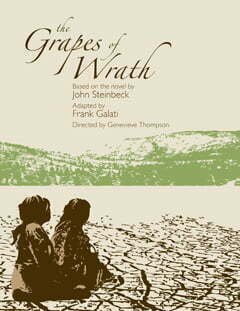The Grapes of Wrath
Based on the novel by John Steinbeck, adapted by Frank Galati

Infamous Commonwealth Theatre
Raven Theatre Complex
“Grapes” provide heady wine for Chicago audiences
In the moments just before a play begins, when the stage is empty and the possibilities endless, it is difficult to predict just how big an impact the performance will make on the audience. Every now and then, the impact is so huge, the emotions so skillfully evoked, that the viewer can only gasp in awe. That’s what happened during the opening of Infamous Commonwealth Theatre’s revival of The Grapes of Wrath, a dazzling event that is right up there with the top 10 best plays I’ve seen since I started reviewing in 1994.
It’s hard to know where to begin the praise. Certainly, the intimacy of the Raven Theatre provides wonderful immediacy. The audience becomes completely involved with the dispossessed Joad family, economic victims of the Great Depression, thrust from their homes in the Dust Bowl of Oklahoma and forced to board their makeshift truck to undertake a hard, tedious migration across the U.S. They hope to find employment – a better life — to fulfill their dreams of success in verdant California.
Moreover, these dreams are simple: to pick fruit, to earn a living, and to fulfill basic desires, which range from possession of an electric iron to home ownership.
The family of 12 (plus an ex preacher) piles into the truck and takes off. What a truck! We see it assembled before our eyes. In a solid piece of stage business, the cast pushes the truck into varied positions, sideways, front view, angled, each providing a different opportunity to focus on specific family members. Then, to add to the clever staging, the truck morphs into other incarnations, ending as a boxcar where the family ultimately shelters itself from the disaster of California thunderstorms and devastating floods.
High praise must go to scenic designer Alan Donahue and to director Genevieve Thompson. Under her skilled direction, we immediately become engaged in the plight of this large family which includes young, struggling Tom (Wes Clark) just paroled from prison; his ever-hopeful mother (Jennifer Mathews), struggling father (John O’Leksy), and grandparents (Judi Schindler and John Zimmerman). We meet his pregnant sister (Jenn Remke), and her husband (Austin Campion), his philandering brother (Matthew Klinger), and his uncle (Paul Joseph), traveling with his two young children (Samuel Johnston and Glynis Gilio). Set amidst these is the winsome, thoughtful ex-preacher (Stephen Dunn), a man struggling to come to terms with his own religious doubts. The fine ensemble of 19 (some taking double roles) succeeds in making each person memorable, capturing not only individual pain but also ultimate humanity. Portrayals are vivid, especially Mathews as a mother helplessly watching her family disintegrate.
Throughout, music underscores the story with violin, harmonica and song. Kudos to sound designer Tom Haigh. He has combined arrangements of well-known pieces, such as Shall We Gather by the River and Darling Corey, with less familiar material (How Can You Keep Moving) as well as his own, original creations: the Car Salesmen’s Song, Route 66 Song, Litany of the Road, and The Grapes of Wrath Song. Haigh notes that the lyrics for these are all present either in Frank Galati’s script or in his own adaptations from a combination of the script and the novel.
Haigh states that he listened to many historic folk recordings in preparation and while the sounds of Appalachian music may be historically inaccurate in the context of Dust Bowl era Oklahoma, for him they represent something fundamentally American which he wanted to evoke here. There is no question that he succeeds.
Grapes of Wrath, a timeless classic, is as relevant today in these hard economic times as when it was written. In 1939, John Steinbeck won the Pulitzer Prize for the novel. In 1940, the film, staring Henry Fonda, won several Academy Awards (Best Supporting Actress for Jane Darwell and Best Director for John Ford ) and nominations (including those for Fonda as Best Actor in a Leading Role and Best Picture). Closer to home, in 1989, Galati’s adaptation for Steppenwolf Theater garnered Jeff awards for Best Play, Best Director, Best New Adaptation, and Best Sound Design, before moving on to London and Broadway (where it won Tony awards for Best Direction and Best Play).
How fortunate we in Chicago now are to have the opportunity of seeing this revival, renewed through the efforts and direction of Infamous Commonwealth Theatre. Not to be missed!
HIGHLY RECOMMENDED
Reviewed by Beverly Friend
Raven Theatre Complex, 6157 N. Clark St., Chicago, IL, 312-458-9780, Tickets $20 ($15 for seniors and students), Thursdays, Fridays and Saturdays at 8:30 p.m., Sundays at 3:30 p.m, running time is 2 hours, 35 minutes with intermission.
Editor’s Note: I could not agree more with Beverly Friend’s review of the Grapes of Warth–it is the best work from Infameous Commonwealth Theatre since their fabulous production of The Kentucky Cycle. This is fine ensemble work that Jennifer Mathews anchors.
Tom Williams
